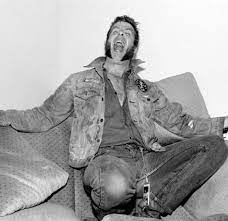Mojo Nixon, a musician, radio host, provocateur and free-spirited pop culture figure, passed away last week at 66 years old.
Nixon’s death was the result of a cardiac event after a night of performing and partying on the Outlaw Country Cruise he co-hosted. While tragic and premature, his passing at least fit well into his outlaw persona, which Nixon’s family alluded to in a statement made on Facebook.
Nixon’s music, though hard to define, probably best falls into the subgenre psychobilly, a combination of rockabilly and punk rock. Nixon also had deep connections to the outlaw country genre, spending nearly two decades as a DJ and host on the Outlaw Country SiriusXM channel.
Creating country-adjacent music with the spirit of punk rock is not a recipe for mainstream success, but the perceived contradiction of those styles helped establish Nixon as a cult figure. He even created his stage name by choosing two words that he felt shouldn’t go together: mojo – slang for sex appeal – and Nixon, after former president Richard Nixon, an antithetical figure to counterculture.
Mojo Nixon’s songs are brash, funny, always irreverent and often profane. Nixon was not afraid to offend or shock, and his songs tended to take no prisoners. A notable example is his 1990 single “Don Henley Must Die,” aimed at one of the founding members of The Eagles. However, Nixon’s charm seems to have come through even to the song’s subject, as Henley performed “Don Henley Must Die” with Nixon onstage in 1992.
Nixon was an anti-authoritarian in the purest sense. There is seemingly no topic — religious, political, sexual or otherwise — he shied away from in song. Any amount of time spent listening to his music makes it clear he refused to be told what to do.
He was part of a dying breed of artists that pushed boundaries purely for the sake of free expression (and upsetting the prudish). This attitude occasionally led him to political activism, like arguing against parental advisory stickers on albums on CNN’s Crossfire.
Nixon’s greatest mainstream success, however, was not one of his more transgressive songs. It was the 1987 hit “Elvis is Everywhere,” a particularly silly novelty song satirizing the cultural idolization of Elvis Presley. The song and its music video became a staple on MTV at the time. As if his career wasn’t bizarre enough, he also played Toad in the 1993 live-action “Super Mario Bros” film.
My first exposure to Nixon was the song “Are You Drinkin’ With Me Jesus” from his 1993 collaborative album with Jello Biafra, “Prairie Home Invasion.” The song is his most popular on Spotify, even surpassing his signature “Elvis is Everywhere.” It has also long been a staple in my outlaw playlist. It’s relatively tame by Nixon’s standards and only mildly heretical, despite the title. It can at least be played in semi-polite company, which can’t be said for his third-most-popular song on Spotify. I’ll leave that for the brave to seek out on their own.
I’ve always had a soft spot for artists like Mojo Nixon. In the faux-documentary “Rolling Thunder Revue: A Bob Dylan Story,” Dylan said a line that I think speaks to the essence of many fine artists.
“Life isn’t about finding yourself,” Dylan said. “Life is about creating yourself.”
Mojo Nixon, born Neill Kirby McMillan, Jr., spent his career creating himself. He cared deeply about rock and country music and created a persona where he could perform both in the rowdiest ways possible. He also had a deep yearning for the mythology of American outsiders and thrived to place himself in that canon.
“I just want to be a tiny piece of the great American crazy myth,” Nixon said in a promotional video for the Outlaw Country channel. “Not the story they tell in schools, not the story they tell in the movies, but the wild, crazy, free nut-job-on-the-outskirts-of-town story.”
I also can’t help but appreciate Nixon’s disdain for any form of authority. It may not be the most sophisticated ideology, but it so often results in cathartic art.
For those looking to dip their toe into the work of Mojo Nixon, the aforementioned album “Prairie Home Invasion” is a good primer. For those looking to dive straight into the deep end, there is an incredibly exhaustive album compilation titled “The Mojo Manifesto” that was released alongside the 2020 documentary of the same name.































































































Diane Welte • Mar 28, 2024 at 2:09 pm
Looking forward to Mojo Nixon event in San Diego on 4-20-24…
Dangerously yours,
Di